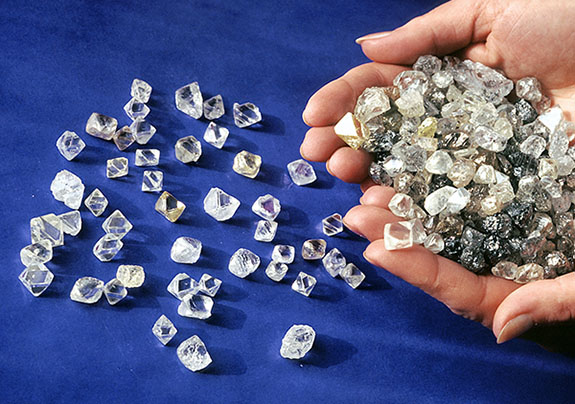April 8th, 2021
By blasting a dime-sized graphite disk at a wall at 15,000 mph (24,100 km/h), scientists were able to emulate the high-energy impact that can turn carbon-based material into super-strong hexagonal diamonds — a variety of the gem that is stiffer and stronger than the diamonds in your jewelry box. That's saying a lot, because the diamonds you own happen to rate a perfect 10 on the Mohs hardness scale.

The researchers at Washington State University's Institute for Shock Physics were looking to mimic the energy of a meteorite striking the Earth because hexagonal diamonds — also known as Lonsdaleite diamonds — have been found in trace amounts at meteorite impact sites, such as Canyon Diablo in Arizona.
Scientists had long theorized that Lonsdaleite diamonds were stronger than conventional cubic diamonds, but the samples were either too small or had too short of an existence to be measured.
During their experiment, the carbon-based disk crashed into a barrier and was rapidly transformed into a hexagonal diamond. Immediately after impact, but before the material was obliterated, the researchers produced a small sound wave and used lasers to measure its movement through the hexagonal diamond. As a rule, sound moves fastest through stiffer materials, such as cubic diamonds. In this latest experiment, sound moved even faster through the lab-created hexagonal diamonds.
Based on that result, the scientist surmised that the hexagonal diamonds were stiffer than cubic diamonds. Stiffness is defined as a material's ability to resist deformation under a force or pressure.
So far, the scientists haven't been able to conduct a scratch test to determine how the Lonsdaleite diamonds stack up against natural cubic diamonds, which are the hardest natural material known to man. The scientists believe, however, the lab-created hexagonal diamonds will prove to be significantly harder than their cubic-shaped cousins.
If these findings are backed up and Lonsdaleite diamonds can be turned out commercially, these super-hard materials will likely find their way quickly into industrial applications, such as drill bits and other cutting devices. Might they also find their way into engagement rings and eternity bands? Only time will tell.
Credit: Image courtesy of ALROSA.

The researchers at Washington State University's Institute for Shock Physics were looking to mimic the energy of a meteorite striking the Earth because hexagonal diamonds — also known as Lonsdaleite diamonds — have been found in trace amounts at meteorite impact sites, such as Canyon Diablo in Arizona.
Scientists had long theorized that Lonsdaleite diamonds were stronger than conventional cubic diamonds, but the samples were either too small or had too short of an existence to be measured.
During their experiment, the carbon-based disk crashed into a barrier and was rapidly transformed into a hexagonal diamond. Immediately after impact, but before the material was obliterated, the researchers produced a small sound wave and used lasers to measure its movement through the hexagonal diamond. As a rule, sound moves fastest through stiffer materials, such as cubic diamonds. In this latest experiment, sound moved even faster through the lab-created hexagonal diamonds.
Based on that result, the scientist surmised that the hexagonal diamonds were stiffer than cubic diamonds. Stiffness is defined as a material's ability to resist deformation under a force or pressure.
So far, the scientists haven't been able to conduct a scratch test to determine how the Lonsdaleite diamonds stack up against natural cubic diamonds, which are the hardest natural material known to man. The scientists believe, however, the lab-created hexagonal diamonds will prove to be significantly harder than their cubic-shaped cousins.
If these findings are backed up and Lonsdaleite diamonds can be turned out commercially, these super-hard materials will likely find their way quickly into industrial applications, such as drill bits and other cutting devices. Might they also find their way into engagement rings and eternity bands? Only time will tell.
Credit: Image courtesy of ALROSA.


